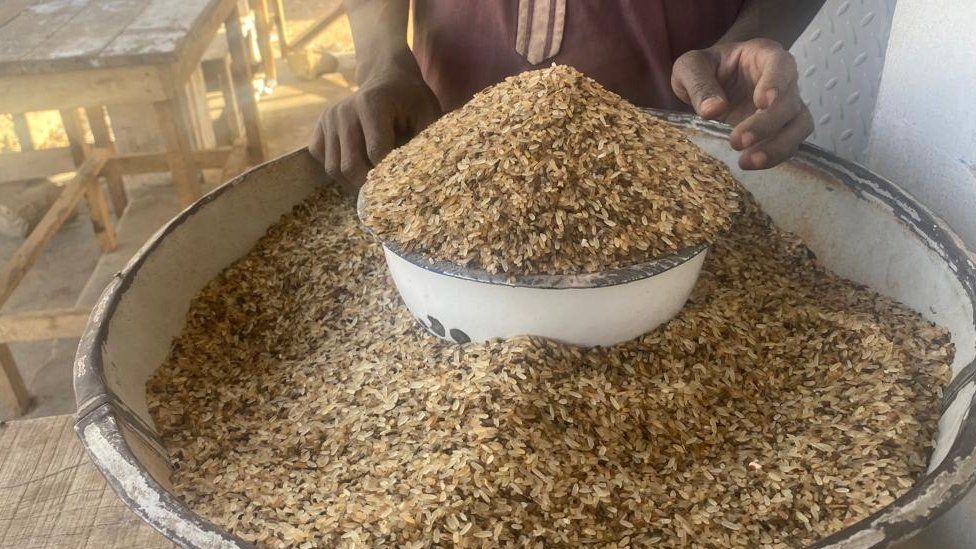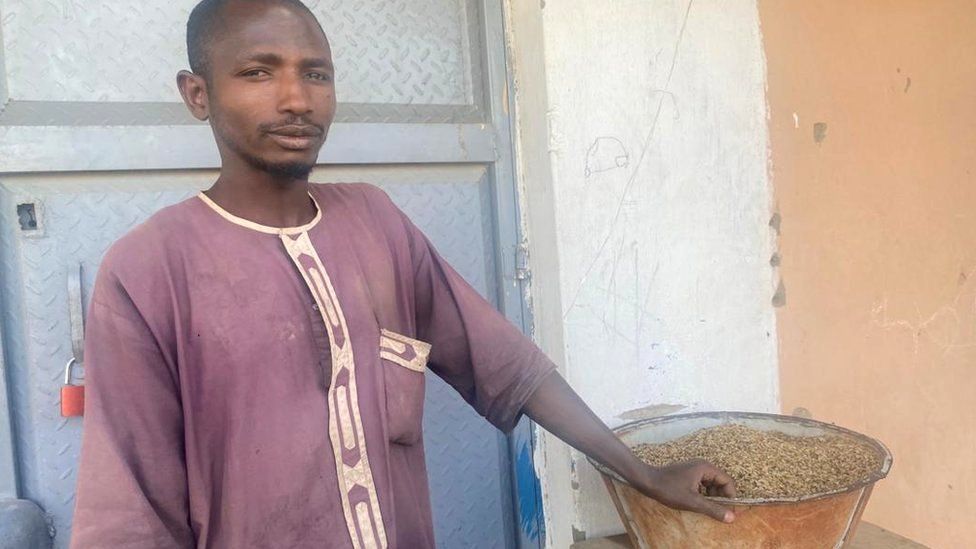

As the rising cost of living continues to bite, many in northern Nigeria are turning to rice grains that millers normally reject after processing or sell to farmers to feed their fish.
These are referred to in the Hausa language, widely spoken in the north, as afafata, which means “battling” because they are literally a battle to cook and eat as the grains are so hard.
“A few years ago, people didn’t care about this type of rice, and we usually threw it away along with the rice hulls, but times have changed,” Isah Hamisu, a rice mill worker in the northern city of Kano, told the BBC.
Despite the grains being broken, dirty and tough, afafata’s cheaper price has made it more attractive for humans and helped poorer families to be able to afford to eat one of the staple foods in the country.
Fish farm owner Fatima Abdullahi said her fish love it but because people are now eating afafata, its price has risen.
Prices in Nigeria are increasing at their fastest rate for nearly 30 years. On top of global pressures, President Bola Tinubu’s cancellation of the fuel subsidy plus the devaluation of the currency, the naira, have added to inflation.
A standard 50kg (110lb) bag of rice, which could help feed a household of between eight and 10 for about a month, now costs 77,000 naira ($53; £41). This is an increase of more than 70% since the middle of last year and exceeds the monthly income of a majority of Nigerians.

In the face of this many are struggling to cope and in some states there have been cost-of-living protests.
Earlier this month in Niger state, central Nigeria, protesters blocked roads and held placards saying that they were being suffocated by the rising prices.
A few days later there was a similar demonstration in Kano in the north-west. In the aftermath, Governor Alhaji Abba Kabir Yusuf admitted there was starvation in his state and said a solution must be found.
The solution, for now, for some is found in afafata.
Hajiya Rabi Isah, based in Kano state, told the BBC that if it were not for this type of rice her children would go hungry as she cannot afford the normal kind.
“Normal rice is 4,000 naira ($2.70) per bowl which is beyond my means, I can only afford afafata which is 2,500 naira ($1.69) now,” she said. One bowl of rice from the market can feed an average family in Kano for a day.
“Without afafata, feeding my family would be a major issue for me.”
Market sellers have also noticed a difference.

Saminu Uba, who works in Kano’s Medile market, said the afafata side of his business is booming.
“Most people can no longer afford normal rice and they come for this which is cheaper even though it tastes less good,” he told the BBC.
One of his customers, Hashimu Dahiru, admits people are having to find ways of adapting./
“The cost of goods is alarming – in just two months the price of everything has doubled,” he said.
“Our wives spend hours removing stones and dirt from the rice before cooking and even then it ends up tasting not nice, but we have to eat to survive.”
The presidency has said it is doing all it can about the situation, including the distribution of more than 100 tonnes of grains such as rice, millet and maize in the hope that it would cushion the effects of inflation and help lower the market price.
But the president’s aide Bayo Onanuga upset many recently when he said that Nigeria still had one of the lowest costs of living in Africa.
The increasing price of rice is not a new problem though.
President Tinubu’s predecessor, Muhammadu Buhari, banned the importation of rice to encourage more Nigerian farmers to grow the crop, but local producers have been unable to meet the demand.
Before then Nigerian markets were filled with rice from Thailand at an affordable price for many.
Mr Tinubu has lifted import restrictions, but now the shortage of foreign currency and the falling value of the naira has made bringing in rice trickier. – bbc.com